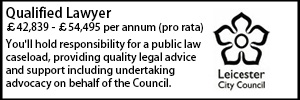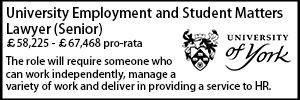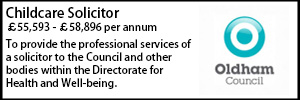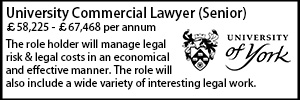Looked after children and medical treatment
- Details
 Eleanor Derry and Deborah Jeremiah consider the issues around obtaining consent for the provision of medical treatment to looked after children.
Eleanor Derry and Deborah Jeremiah consider the issues around obtaining consent for the provision of medical treatment to looked after children.
Many professionals working within the healthcare sector will come into contact with the term "Looked After Child" ("LAC") but what does this actually mean? The Children Act 1989 assists and explains that the term refers to a child who is:
- Accommodated by a local authority for a continuous period of more than 24 hours;
- Subject to a care order; or
- Subject to a placement order.
If a local authority has a care order or placement order in respect of a child, the child is said to be 'looked after' and the local authority will hold parental responsibility ("PR") for that child as their corporate parent. However, the fact that a local authority holds PR for a child does not extinguish the parents' parental responsibility and a local authority should still consult the child's parents with regard to the delivery of their care.
Who can provide consent for medical treatment of a LAC?
1. Children subject to care or placement orders
Consent for medical treatment of a 'looked after' child who is subject to a care or placement order has the potential to be a grey area, particularly where treatment needs to be delivered on an urgent basis. Consent should be obtained from the child's parents as well as the local authority (i.e. all those with PR), but it is the local authority under s.33 Children Act 1989 that determines the level at which parents exercise their PR in respect of their child. In essence, the local authority has the final say.
A local authority should only be restrictive where s.33 is concerned if to do so would safeguard or promote the child's welfare. Actions that would safeguard and promote the child's welfare are topics that are up for debate, and will clearly need to be considered subjectively on a case by case basis. If a decision to provide medical treatment to a child under a care or placement order becomes contentious and concerns particularly invasive or high risk treatment, a local authority would be wise to seek legal advice and potentially place the matter before the Court.
2. Children subject to s.20 Children Act 1989
If a child is accommodated by a local authority for a continuous period of more than 24 hours but not subject to a care or placement order, they are likely to be subject to s.20 of the Children Act 1989. Therefore, the local authority will not share PR for the child but the child is still deemed to be a LAC.
Accommodation under s.20 ordinarily means that the local authority has obtained consent from the child's parents for the child to move into local authority care on a temporary basis, sometimes due to a parent's ill health, a difficult but transient family situation or pending the commencement of care proceedings. In these situations, medical professionals should obtain consent to medically treat the child from the child's parents because the local authority, despite caring for the child in practical terms, does not hold PR and is not legally entitled to consent to the medical treatment of the child. Assumptions should therefore not be made that as the child is in foster care, the local authority can provide consent to treatment.
However, it goes without saying that whenever a child is 'looked after' under s.20, medical professionals should still involve the relevant local authority to ensure that it is fully aware of the treatment to be provided to the child for a whole host of reasons, most sensibly to enable the child's foster carers to provide any after-care required.
Practical steps
In N (Children) (Adoption: Jurisdiction) [2015] EWCA Civ 1112, Munby P declared that the misuse and abuse of s.20, to include the failure of local authorities to obtain informed consent from parents, is a denial of the fundamental rights of both the parent and child, 'it will no longer be tolerated' and 'it must stop'. Munby P spoke with particular regard to the length of accommodation of a child under s.20 before care proceedings were issued, but his comments are a word of warning to local authorities in their use and application of s.20 Children Act 1989 and in terms of obtaining consent.
A logical approach when asked to treat a LAC would be to ensure that wherever possible the treating medic has all of the information needed from the child's social worker before providing any treatment to the child. For example, if a child is accommodated under s.20 (whereby the local authority is unable to consent to medical treatment on the child's behalf), treating professionals should check whether there is anything preventing them from liaising with the child's parents, for example there may be safeguarding measures in place such as a court order preventing a parent's contact with the child. Theoretically, both parents should be invited to attend medical appointments for the child provided that it is safe to do so. It is sensible to clearly document conversations had with social workers, guidance sought and decisions made.
When any child is referred to as 'looked after' or when a local authority is undertaking safeguarding interventions regarding a child, it is essential that good quality communication takes place between medical professionals and social care professionals. Clear, inter-agency communication is a requirement of the 'Working Together to Safeguard Children 2018' guidelines. Often, the information shared is required within statutory pre-proceedings child protection interventions or within court proceedings. It could be required to inform the long term care plans for a child, an adoption or fostering profile or used to inform an independent expert examination of a child where a non-accidental injury is suspected.
It is important to remember what court order, if any, is in place in respect of the child at the time that consent for treatment is considered and obtained. The fact that a local authority may have applied for a care order does not mean that a Court will grant the order sought. Consideration of the appropriate individuals to ask questions of should be considered, and an independent clinical decision made and documented.
Conclusion
Therefore when asked to treat a child and told that the child is 'looked after', it is important that the necessary steps are taken to enquire on what legal basis the child is accommodated and whether there is anything else that should be known which is pertinent to the current situation and continued safeguarding of the child. This should enable valid consent to be obtained from the correct source and encourage the involvement of the necessary people in the medical decisions made. To carefully consider the circumstances of each LAC should aid the protection of the child's rights and ensure that, in often pressured situations, the parents' legal rights are not unlawfully overlooked or overridden.
Eleanor Derry is a solicitor and Deborah Jeremiah is an associate at Bevan Brittan. Eleanor can be contacted on 0370 194 5426 or by email, while Deborah can be reached on 0370 `94 1748 or








































